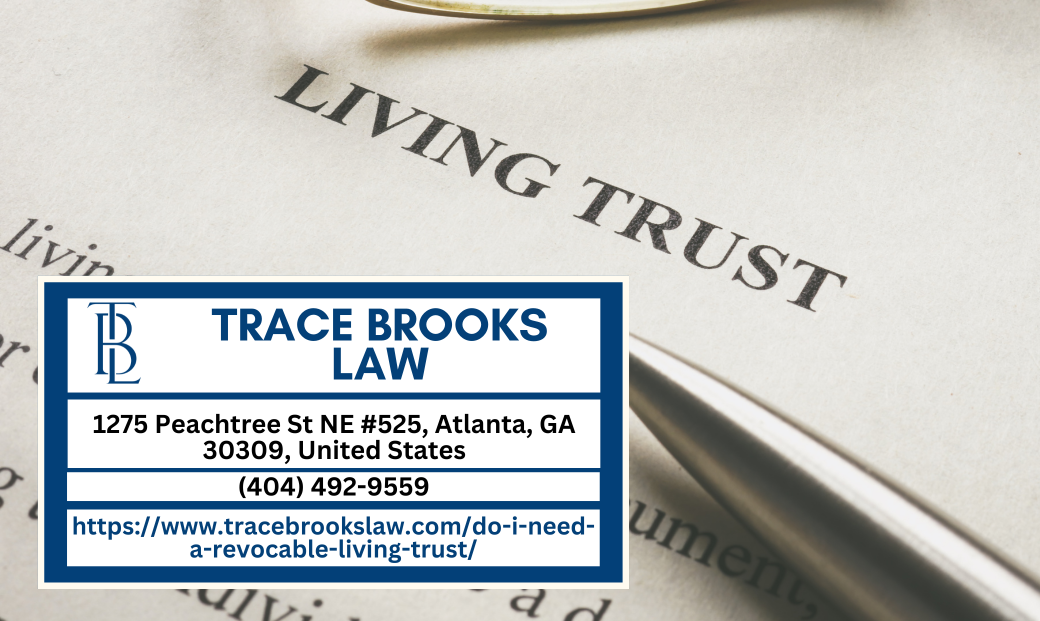Atlanta estate planning attorney Trace Brooks (https://www.tracebrookslaw.com/do-i-need-a-revocable-living-trust/), founder of Trace Brooks Law, has published a comprehensive article titled “Do I Need A Revocable Living Trust?” The article provides an in-depth look at the benefits and considerations associated with revocable living trusts, an increasingly popular estate planning tool.
Atlanta estate planning attorney Trace Brooks explores the circumstances under which a revocable living trust can be a valuable addition to an individual’s estate plan. “In the right circumstances, revocable living trusts can be extremely beneficial,” Brooks asserts. “However, they can also be unnecessary or even counterproductive in some cases.”
In recent years, revocable living trusts have gained popularity as a strategy for managing assets efficiently during one’s lifetime and after passing away. Atlanta estate planning attorney Trace Brooks explains that these trusts offer a dynamic approach to asset management, allowing the trust creator, or grantor, to modify trust provisions as long as they remain mentally capable. This flexibility includes adjusting distributions, appointing or removing trustees, and adapting to current laws.
One of the key advantages highlighted by Atlanta estate planning attorney Trace Brooks is the ability of revocable living trusts to avoid the probate process upon the trust creator’s death. This means that assets can be distributed to beneficiaries according to the terms set forth by the grantor without the delays and public scrutiny associated with probate. Once the trust becomes irrevocable, no further alterations can be made, ensuring that the grantor’s wishes are solidified.
Brooks also emphasizes that a revocable living trust requires ongoing attention and maintenance. “For the trust to function effectively, it must be properly funded,” Brooks advises. “This involves retitling assets in the trust’s name and incorporating new assets as they are acquired.”
The article outlines several advantages of using a revocable living trust. One significant advantage is privacy. Unlike a will, which becomes part of the public record upon death, a revocable living trust keeps asset distribution private. This ensures that the details of who receives what assets remain confidential. Another advantage is the avoidance of out-of-state probate. A revocable living trust can prevent the need for probate in multiple states, saving time and costs. This is particularly beneficial for individuals who own property in different states. Additionally, the trust offers simplicity in cases of incapacity. If the grantor becomes incapacitated, the trust allows for a seamless transition of asset management without the need for court intervention. This feature is particularly useful for maintaining financial stability during difficult times. Furthermore, the trust provides simplicity for blended families. Estate planning complications often arise when there are children from prior relationships. The privacy of a revocable trust can help manage these complexities effectively.
While the benefits are significant, Brooks notes that there are also drawbacks to consider, such as the initial cost and complexity of creating a revocable living trust. “Drafting an effective pour-over will and revocable living trust requires additional legal work, making the estate plan more costly upfront,” Brooks explains. “Additionally, the proper retitling of assets can be complicated and time-consuming.”
Despite these challenges, the ability to revoke or amend the trust at any time gives the grantor flexibility and control. Brooks encourages individuals to consult with an experienced attorney to determine whether a revocable living trust is suitable for their estate planning needs.
For those seeking to understand whether they need a revocable living trust or to review an existing trust, Atlanta estate planning attorney Trace Brooks can offer knowledgeable guidance. “Contact Trace Brooks Law to schedule an appointment and further ensure your estate planning objectives are met,” Brooks advises.
About Trace Brooks Law:
Trace Brooks Law, based in Atlanta, GA, can provide comprehensive estate planning services to individuals and families. The firm is dedicated to helping clients navigate the complex aspects of estate planning, ensuring their assets are managed and distributed according to their wishes. Trace Brooks Law can offer personalized legal strategies tailored to meet the unique needs of each client.
Embeds:
Youtube Video: https://www.youtube.com/watch?v=zJa7Bpmrmrk
GMB: https://www.google.com/maps?cid=16944830140697754407
Email and website
Email: trace@tracebrookslaw.com
Website: https://www.tracebrookslaw.com/
Media Contact
Company Name: Trace Brooks Law
Contact Person: Trace Brooks
Email: Send Email
Phone: (404) 492-9559
Address:1275 Peachtree St NE #525
City: Atlanta
State: Georgia 30309
Country: United States
Website: https://www.tracebrookslaw.com/

